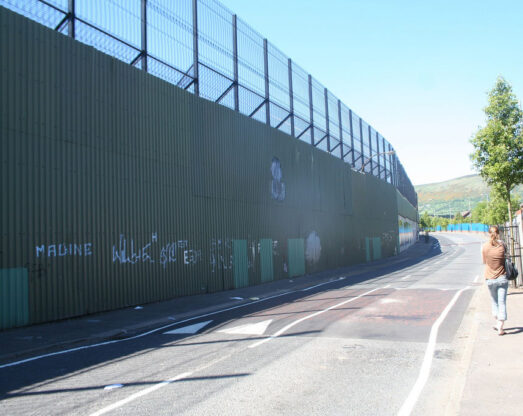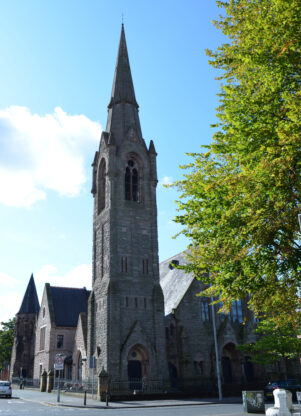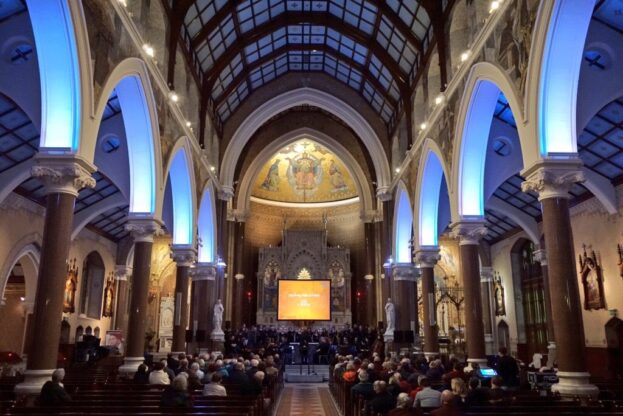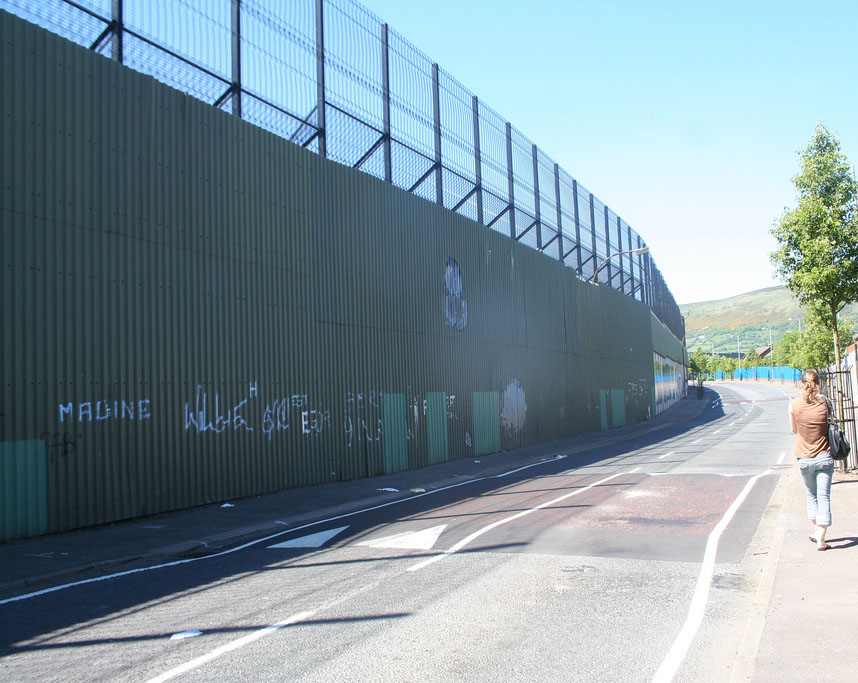
by Steve Stockman
Rev. Steve Stockman is the Minister to Fitzroy Presbyterian Church in Belfast. He is author of the book Walk On: The Spiritual Journey of U2 (Relevant Books, 2001) and a regular contributor on BBC Radio Ulster.
Introduction
It is quite a moment. Unforgettable for sure. After lining up with the thousands already going through security at St Peter’s Basilica at 8am on a beautiful Italian spring morning we are suddenly ushered away. Like the chosen few we are now walking through wide corridors, nodding at the Swiss police standing to attention. Then up what seemed like an awful lot of steps, through a long series of throne rooms to the last one, a waiting room.
We wait for about twenty minutes, admiring the art work. Then there is movement. A Dutch Bishop opens a door and walks through to us. The anticipation is heightened. The young women fix their dresses. The young men their ties. My plastic clerical collar had snapped in two as we were going through security. My wife, Janice, is making sure it stays in.
Suddenly our group is moving. Slowly. Janice and I are wondering why. Then suddenly we round the door and Pope Francis is standing in all his charismatic humility. He reaches out his right hand out to welcome us into his Private Library in the Apostolic Palace at the Vatican.
It is quite overwhelming, as it is when you meet someone who is that famous. Even more so as we had imagined him already seated and us being shown to ours. No, he is determined to greet us personally, to make us feel special. So, Pope Francis looks me in the eye and shakes my hand. I lean in and say, “I am the Presbyterian in the group”. He reaches for my arm with his other hand and says, “Well, then you are particularly welcome.” We smile again.
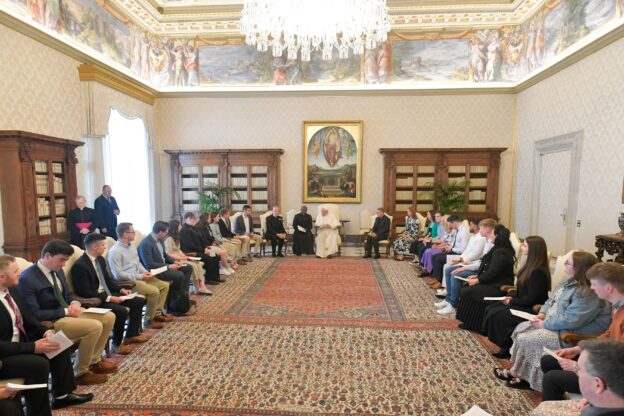
Pope Francis meeting with the students from the QUB Catholic Chaplaincy on 25th April 2022. Rights: Alamy
How did a Presbyterian from Ballymena, the Bible Belt of Northern Ireland, end up in a private audience with the Pope? It is quite a journey. It is my journey. I am so thankful for that journey, everywhere God has led me, everything God has taught me, all that I have experienced, got wrong, confessed and, like that clerical collar, made right again. I am most surprised and privileged at reaching this particular destination on my journey.
Love Your Enemies
“No Pope Here!” That was a slogan I was familiar with growing up. Who knows, as a child I might even have shouted it with my mates. There are many who still stand by the sentiment. There are many who felt angry and maybe even betrayed that I shook hands with the Pope.
In a fascinating new book How to Inhabit Time, James K. A. Smith writes:
“Our past is not what we have left behind; it’s what we carry. It’s like we have been handed a massive ring of jangling keys. Some of them unlock possible futures. Some of them have enchained our neighbours. We are thrown into the situation of trying to discern which is which.”[1]
If Smith is right, and I believe he is, then I carry not only my personal family past with me but the societal past too. I grew up in a middle-class, white, mid-Antrim family in a predominantly Unionist town. There are a lot of jangling keys there. Then as a teenager I had a Damascus Road conversion to a Presbyterian, evangelical faith. More keys!
Deciding to follow Jesus as a seventeen-year-old was dramatic for me. I had been an atheist from about the age of seven. It was a humiliating about-face and change of direction. Though momentous, it was also quite naive. I was excited to follow Jesus but had no idea about the keys from the past that I was now going to get caught up by.
As I look back now I believe that at the time of that conversion I was a peacemaker in its purest form, but it all got encrusted. I came to Jesus via The Beatles. In my teens, music was my way in to work out the big questions. I was an atheist and The Beatles attempted to fill the God-shaped hole. “All You Need Is Love” and “Give Peace a Chance” were slogan choruses that I could stand behind.
I then realised that The Beatles were asking the right questions, pointing to some answers, but their answers lacked a robustness. The flower power of 1967 was all turning violent by 1969. As singer Larry Norman once sang, “The Beatles said all you need is love but then they broke up.” When I started reading about Jesus I saw someone who was also concerned with these issues but somehow had some spiritual energy to make them happen.
Chapter 6 of Luke for me is the “hardest ask” in the Gospels. There are so many counter-intuitive challenges to following Jesus but it gets no more hard-core then when Jesus says, “But to you who are listening I say: Love your enemies, do good to those who hate you, bless those who curse you, pray for those who mistreat you (Luke 6:27-28 NIV).” This is the kind of exhilarating vision that a teenager responds to. This is beyond eating and working and sleeping for 70 years before you die. This is a life worth living, if you can reach it!
When I read “love your enemies” in 1979’s Northern Ireland, it did not take me too much thought to apply it. Ballymena, where I grew up, might not have been an epicentre of the bombs and bullets but I knew we were a divided country. I now knew that Jesus wanted me to love my enemies.
Peacemaking, it seemed to me, was at the heart of the Gospel. Right there at the birth of Jesus, there were angels singing to shepherds about peace on earth. That should not be much of a surprise as shalom – a word whose meaning transcends merely ‘peace’ to suggest a wholeness and completeness that spans not just society but all of Creation – is a major concept in Old Testament theology and practice. A slip towards error is when we see the peace that Jesus came to deliver as entirely personal. If we miss the societal aspect of shalom, we confine and restrict the breadth of the Kingdom of God that Jesus emphasises in his taught prayer.
The Church has a peacemaking vocation that is lost in our sectarianism. The Gospel is not about justice or vengeance; it is not about proving who was right or wrong. It is not about us and them and us winning. The point of this mission that God had in coming to earth was peace. That peace was not just for my soul. It was about peace on earth. Anyone following this Jesus whose birth is heralded in this angel’s song should be all about peace.
Converted Again Through Friendship
About a year after my conversion, I got involved in a spat in the letters page of our local paper, The Ballymena Guardian. I wrote about this love for the enemy. My spiritual innocence was shocked when another Christian wrote a letter attacking me the very next week. Attacking me for quoting the Bible? The shock soon became sadly too familiar.
Looking back, thirty-five years later, I realised that this was the start of my encrusting. Very quickly that young adult, with a yearning to cultivate peace in his surrounds, got his soul weighed down with cultural, societal and, worst of all, ecclesiastical myths and fears that stopped me from following Jesus as I should.
That set me on a path: A low, unchallenging one. For thirty years I was what Professor John Brewer would call a “passive” peacemaker.[2] I was a believer in peacemaking and as a chaplain at Queen’s University Belfast I taught it to my students. We took student teams to South Africa where we engaged with reconciliation with the help of International Centre for Transitional Justice.[3] Yet the encrusting still stopped me short of engaging with the “other side.”
Then near the end of my time at Queens, the other two full-time chaplains and I took a decision to welcome and try to work alongside a new Catholic chaplain, Fr Gary Toman. His friendship was like a John the Baptist preparing the way for what Professor Brewer described as the better way of “active” peacemaking.
In 2009, I became the minister of Fitzroy Presbyterian Church in the shadow of Queens University. I was by now much more prepared for the congregation’s peacemaking DNA and their ongoing relationship with Clonard Monastery in West Belfast.[4] The Clonard-Fitzroy Fellowship had been active since 1981,[5] originating on the simple foundation of a friendship between Very Rev. Dr Ken Newell and Fr Christopher McCarthy. In 1999, Fr. Gerry Reynolds and Ken won the Pax Christi Peace Prize.[6] I was standing on the shoulders of these peacemaking giants. I was soon visiting Clonard Monastery regularly and was a guest speaker at their 2010 Novena. I began to believe that the Holy Spirit was chipping away at the encrusting, trying to free me from it.
If I can mix metaphors for a moment, I began to see that encrusting as a hard layer on top of the soil of my soul. Jesus’ telling of the parable of the sower speaks of God’s word landing on hard ground. You don’t need to be agrarian to see it bouncing down the path. All those things that I had feared had encrusted my soul so that I was hardened to hear God’s word of invitation to reconciliation.
Thankfully, the encrusting was about to meet its end. I had recently struck up another friendship across the divide, Fr Martin Magill. He was parish priest in St Oliver Plunkett’s, Lenadoon at that time.[7] He wanted to do Irish language classes that brought together both communities. He knew Protestants would find it hard to go to Lenadoon but felt that Catholics would go to Fitzroy, where an Irish language service – An Tor ar Lasadh – was already being held once a month.
Martin and I met for a coffee and something happened. It was a kairos moment. Like meeting God, like meeting Janice my wife, that coffee seemed like something significant had happened. It was like a vocational friendship. Over the next few months we met up, attended each other’s churches. Then came the invitation that led to that smashing of my encrusting.
Fr Martin was invited to hear Gerry Adams’ closing address of the 2011 Sinn Féin Ard Fheis that was taking place in Belfast. Having asked my predecessor in Fitzroy, Ken Newell for advice, Ken told Martin that he should go… and, being aware of our new friendship, that he should take me with him.
It was at that point that the encrusting did its deadly deed. As I pondered whether to go along with Martin, I could see a TV camera scanning around the hall catching me sitting beside a Catholic priest listening to Gerry Adams. What would my family think? What would my hometown of Ballymena think? What would my denomination think? Would I get myself onto to those awful talk-shops on the radio where I would be asked difficult questions and other contributors would shout “Lundy” at me? Would I be judged as “unsound” and damned by Presbyterians across Ireland? I knew what I should do but the encrusted ground stopped me from doing it. I said no. Fr Martin went to hear Gerry Adams on his own.
The very next morning the encrusting was finally smashed. I got up in Fitzroy during our Sunday morning service and repented for not attending the previous night’s Ard Fheis. I shared all my fears and told my congregation that it was utter disobedience to God’s call to peacemaking and I allowed my fears to get in the way of following Jesus. As I look back I believe that it was a turning point in my life and ministry. I broke through the encrusting that had confined me as a passive peacemaking where I could talk a good game but was too fearful to move into active peacemaking.
Awkward Dance of Reconciliation
I find what happened next, wonderfully Biblical, poignant and very amusing. Four years later I got a phone call one afternoon from Declan Kearney, the northern Chairperson of Sinn Féin.
- Steve, the Ard Fheis is in Derry this year.
Ha! The soil is fertile. I know how I am going to answer this. I’m going to say, “Yes Declan I would love to attend.”
Then…
- And we were wondering if Fr Martin and you would like to come along and address the Ard Fheis.
A deflated silence on my end. What?!?!
- Ah… ok Declan… can you give me some time to think about that!
The apostle John, in his first letter, writes “If we confess our sins, he is faithful and just and will forgive us our sins…” (1 John 1:9 NIV). I call that the cuddly part of the verse. I knew and welcomed God’s forgiveness that morning in Fitzroy when I confessed to the impact of all my encrusting. I was forgiven. However, the verse then moves from God’s caress of grace to his clashing with our selfishness. God loves us enough to forgive us but loves us even more to fix us. That means changes in behaviour. So, John continues, “… and purify us from all unrighteousness.” I often joke that maybe if I had just gone to that first Ard Fheis I wouldn’t now have to consider speaking at the one in Derry!
The work of reconciliation is not easy. Fr Martin and I took time to consider the invitation. We spoke to many people in many walks of life. I spoke to close friends who had lost loved ones in the Troubles. I needed their permission. We were careful about every word we spoke. Breaking through the encrusting and ploughing up the soil to be more fertile for God’s Word did not mean that there were not dilemmas and complexities. As I put it in a poem at the time:
This is an awkward dance
With partners disconcerting
The tender tentative steps
With all our wounds still hurting
Take two up and one back
Move close to hold the seams
Swirl in the suspicious space
To swoop in audacious dreams.
The Gospel is an awkward dance.
I preached a short series in Fitzroy recently based around a definition of sin by the American Presbyterian minister and author, the late Frederick Buechner. In his book called Wishful Thinking; A Seeker’s ABC in which he defined lots of theological words with wit and depth of wisdom, he wrote this about sin:
The power of sin is centrifugal. When at work in a human life, it tends to push everything out toward the periphery. Bits and pieces go flying off until only the core is left. Eventually bits and pieces of the core itself go flying off until in the end nothing at all is left. ‘The wages of sin is death’ is Saint Paul’s way of saying the same thing. [8]
As a more pragmatic-than-cerebral theologian, who constantly surmises the outworking of the Scriptures in everyday life and particularly human relationships, this works for me. It is a simple but powerful image of the effects of sin. Whether personal or societal, political, or indeed ecclesiological it pushes away the Other.
The first three chapters of Genesis are all about pushing away. As Adam and Eve reach for the forbidden fruit hoping that it will make them more than the humans that they were created to be, and become more like God, they end up less than they were, as broken fallen humans. That worked out in pushing away God, pushing away each other, pushing away the pieces of our very own souls.
Jesus’ Gospel, on the other hand, bridges the gaps. He draws people in, first to God, then to self, our neighbours, our enemies, and stretching out to all of Creation. That is what the peace that the angels of the nativity were singing about does. God comes to earth in human form to draw us back. The Gospels are strewn with awkward dances of reconciliation. Think of Zacchaeus, the woman caught in adultery, or the Roman centurion who servant Jesus healed. Jesus in all his encounters was reconciling. Jesus on the cross was reconciling. It was not smooth or painless. It was denial of self and sacrificial (2 Cor 5:11-21 NIV).
The work of the Kingdom of God is reconciliation. Peacemaking is not a deluxe add-on to following Jesus. It is right at the core of it. It is what it is about. With all my encrusting blasted, I was able to finally live it.
Fr Martin and I did address that 2015 Ard Fheis in the Millennium Theatre in Derry. We spoke about grace. We called it the gem of Christianity, that it means unconditional love and that God loved us and made the first move. We shared how we believed that only by grace could relationships be restored.
4 Corners Festival and an Invitation
Three year earlier, in 2012, Fr. Martin and I, with an amazing bunch of soul mates, founded the 4 Corners Festival.[9] The Festival is held annually in Belfast and aims to bring the city together with different arts, talks, storytelling, and sports events. Last year was our 10th anniversary and we were delight that the Archbishop of Canterbury, Justin Welby agreed to speak.
It was at this stage of our planning that put in motion the immediate chains of events that led us to the Vatican. My friend, Máirtín Ó Muilleoir, invited me to review Pope Francis’ book Let Us Dream; The Path To A Better Future for the Anderstown News.[10] I could see his angle. A Presbyterian minister reviews The Pope! He had no idea what he started.
I found the book prophetic. Yes, there was a lot of Catholic discussion that either seemed irrelevant or not theologically suited for me. But there was much which challenged me deeply. I loved how he talked about Covid-19 as a ‘stoppage’. He went on, “In every personal ‘covid’, so to speak, in every ‘stoppage’ what is revealed is what needs to change; our lack of internal freedom, the idols we have been serving, the ideologies we have tried to live by, the relationships we have neglected.”[11] I have used that some in my sermons since.
I loved his emphasis on the common good and the danger of what he called “hyper-individualism”. I was whispering Amen to his belief “that wealth must be allowed to roam unhindered in order to provide prosperity to all.”[12] When he wrote about the “great danger in remembering the guilt of others to proclaim my own innocence” and of “reducing a person’s history to the wrong they did,”[13] I was listening in my own context of Northern Ireland.
I loved it so much that I found myself jokingly suggesting that we book him for the 4 Corners Festival. In the midst of the laughter, the soundtrack of most of our planning meetings, someone said that Austen Ivereigh had helped Pope Francis write the book.[14] Who? I was told about Austen and immediately suggested that we find a way to bring him over for the Festival. So, we did, and Austen opened our Festival in the Anglican St Anne’s Cathedral while Justin Welby closed our Festival in the Catholic St Peter’s. Even more amazing than this, Austen had been with Pope Francis days before the Festival and got us a two-minute video message.[15]
After the first Sunday evening event, Austen came back to our house for some refreshment and outrageously suggested that he should try and get Fr Martin and I into a private meeting with Pope Francis to celebrate the 10th Anniversary of 4 Corners. It would also coincide with the 50th Anniversary of the Catholic Chaplaincy at Queens University. We could go together. We laughed out loud but a few weeks later and the invitation came.
Conclusion
When we all had sat down in Pope Francis’ private library, he quickly grabbed my utter respect. He told us that his speech was translated and printed and on our chairs. So, he went on, you can read that later. Let’s have a chat instead. Any questions? What he had just done was far from lost on me. Here was an 86-year-old man giving up his control of the meeting. A man of that age to have the confidence to let go and believe that he was going to be mentally sharp enough to answer any question that might come his way. Questions not given in advance. A challenge at any age but at 86? But then, he is the Pope!
As well as sharp, I found his conversational style warm, intimate and humorous. When the students asked about how they could share the faith with their friends, Pope Francis first of all eased their intensity. He told them to have fun and be students! He even suggested that he himself did only as much as he needed to pass his exams. I related! He spoke of about the importance of having a drink and a laugh with friends.
Pope Francis encouraged us to get ourselves a little book of the Gospels. Keep it in our pockets. Read it when the opportunities came. If we steep ourselves in these stories of Jesus we will eventually wear him. He discouraged preaching at your friends. It puts them off. Then, my favourite line from the day, “The soul is moved by witness”.
Perhaps it was having a couple of Presbyterians in the room but he then shared about being out walking with his grandmother at around the age of five and bumping into two women from the Salvation Army. Though not Catholic, his grandmother was very positive about them. He said it was his first ecumenical moment. He encouraged the students to see their Protestant friends as brothers and sisters in Christ.
The Pope didn’t seem to have any time for those who keep us divided. He suggested, with that humour again, that we should send all the theologians out onto an island where they could debate the theological differences while the rest of us stayed in the real world and got on with it. That ‘it’ was very clearly the living out of the Gospel, working together in Kingdom building, justice and peace.
I thanked the Pope for his message to our 4 Corners Festival and how amazing it was to have him open the Festival and then have Archbishop of Canterbury, Justin Welby, close it. His eyes lit up at Justin Welby’s name. He spoke very fondly about his him as a dear brother and their work together for peace in South Sudan.[16] He told us that they were keen to meet the South Sudan leaders in July but that the Pope had refused to respond to their invitation until Justin Welby and his wife Caroline were invited on an equal footing to himself. That humility again; that working together.
I have one regret. As we left, the Pope again stood at the door and greeted each of us, gifting us with Rosary beads, even the Presbyterians. I was at the end. It was again very personal. As I went to leave he asked me to pray for him. I felt that humility yet again. I cannot tell you how sorry I am that I didn’t put my hand on his shoulder and pray right there and then. Maybe next time!
As we left he asked that I would pray for him. I heard from a Belgian priest outside that Francis has arthritis in his knees and is in some pain. I told him I would pray for him, especially his knees. He thanked me and I was gone… gone to continue to follow the same Jesus my brother Francis follows.
God had taken me on a long journey, both joyous and painful at times in differing measures. Through His commitment to dealing with the encrusting of my heart—slowly closing me off from fraternity with people of different traditions— I can now recognise the Holy Spirit’s ongoing work to loosen its stranglehold over 35 years. Ultimately, answering God’s call to active peacemaking was the tipping point causing the encrusting to shatter thereby opening me up to a new world of opportunity and possibility. I no longer had to be shaped by fear, defensiveness, or the court of public opinion, but could step confidently into the life-affirming reconciliation work of the Kingdom of God. To understand that peacemaking is at the heart of the Gospel, and to live in the grace and rhythms of that practice, has changed my life, my ministry, and my relationships. It has made all the difference.
To download a pdf of A Presbyterian Meets the Pope click here


